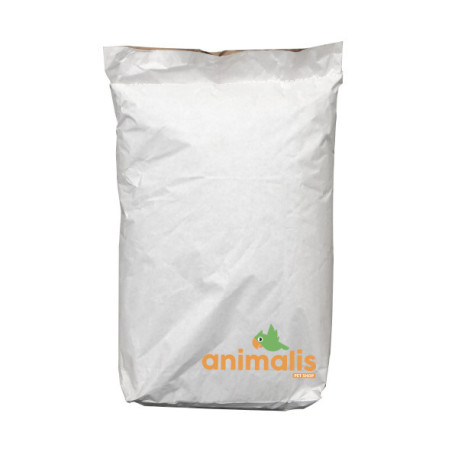





Reference: SOJA25KG
Soybeans are an excellent source of iron, zinc, manganese, copper, selenium, potassium, vitamins, fiber, polyunsaturated fatty acids and antioxidants, in short, it is an excellent dietary supplement.
Soybeans are often used in sprouting seed mixes.
Soybeans are an excellent source of iron, zinc, manganese, copper, selenium, potassium, vitamins, fiber, polyunsaturated fatty acids and antioxidants, in short, it is an excellent dietary supplement.
Soybeans are often used in sprouting seed mixes.
Clover stimulates the immune system and slows down cellular ageing through its excellent antioxidant properties. Rich in vitamins B, C, E and provitamin A.
White Perilla seeds contain about 25% lipids, of which 65% is omega-3 alpha-linolenic acid, a polyunsaturated fatty acid (PUFA): good fat!
High-quality seeds with high fat content
- With a high content of vitamin E, B9, B5, B6, B1, B2, B3, and vitamin K.
- It has antioxidant properties.
- Excellent energy contribution.
- Rich in calcium, potassium, magnesium, phosphorus, proteins, zinc, thiamine, pectin (cleanses the body).
Birds like to remove the shells from peanuts and then eat the peanuts. Peanuts are a source of energy, which is very important for the long winter months.
Unpeeled peanuts can be given to parrots as a treat.
Premium high-quality, high-fat seeds
- With a high content of vitamin E, B9, B5, B6, B1, B2, B3 and vitamin K.
- It has antioxidant properties.
- Excellent energy contribution.
- Rich in calcium, potassium, magnesium, phosphorus, protein, zinc, thiamine, pectin (cleanses the body).
Niger, birdseed rich in phosphorus and calcium. Niger seeds (or nyjer seeds) are fine seeds rich in oil. They come from Guizotia abyssinica (also known as Guizotia oleiferous). The niger is highly prized by most birds, goldfinches and siskins love it.
The seed is mainly grown in India, Burma, Ethiopia and Nepal. Niger is an oilseed with a high fat content (38-43%) and protein content (23%). It provides quality food for all species of wild and forest birds, both in dry and sprouted form.
Niger is one of the few birdseeds with a good ratio of calcium to phosphorus.
These seeds rich in fat and protein are especially appreciated by wild birds. They will attract sizerins, finches, goldfinches, black-capped, sparrows, mourning doves and a host of other birds to your garden. It is often used as a replacement for the shuttle, which is more expensive.
Properties of Pine or Larix seeds.
Anti-inflammatory, analgesic, antispasmodic,
Antiseptic, anti-infectious (pneumococci),
Decongestant of the small pelvis and prostate,
Diuretic
Expectorant, tonic for the respiratory organs.
Chia is a sage. It is an annual plant that can reach up to 1 meter in height, with the scientific name Salvia hispanica.
The composition of chia seeds closely resembles that of other mucilaginous seeds like flaxseeds and psyllium. Unlike flaxseeds, chia does not have anti-nutritional factors, which limit the use of flaxseeds without prior heat treatment. Anti-nutritional factors are cyanogenic glucosides or linatins, inhibitors of vitamin B6 that prevent its action. Moreover, chia has a much more pleasant taste than flaxseeds, and birds consume it more readily.
Striated sunflower is the basic seed of any parrot mixture. It is also used in mixtures for parakeets and exotic doves.
It is also the favorite food of your outdoor birds during the winter period! Ideal for feeding the birds in your garden.
Practical information for giving sunflower seeds to birds in your garden:
Remember to regularly clean the feeders of your outdoor birds so that diseases and bacteria do not thrive.
Also consider setting feeders high up to prevent predators (such as cats, foxes, etc.) from targeting birds when they are eating.
Foniopaddy Seed is a natural grass seed grown on our plantations in Uganda. Scientific research has shown that Foniopaddy has a beneficial effect on coccidiosis.
Pine seeds are a good source of Phosphorus, Magnesium, Zinc, Manganese, Copper, Iron, Vitamin E, K, B1, B2, B3, B9.
Japanese millets (often called Echinochloa esculenta or Japanese millet) are small ancient grains traditionally cultivated in Asia, appreciated both for human consumption and as seeds for birds and poultry.
Description:
Appearance: small round seeds, smooth, ranging from pale yellow to golden brown.
Size: approximately 1.5–2 mm.
Taste: mild, slightly sweet, and floury.
Composition: rich in complex carbohydrates, proteins (10–12%), fibers, vitamins (B1, B2, niacin), and minerals (magnesium, iron, phosphorus, manganese).
Naturally gluten-free.

Soybeans are an excellent source of iron, zinc, manganese, copper, selenium, potassium, vitamins, fiber, polyunsaturated fatty acids and antioxidants, in short, it is an excellent dietary supplement.
Soybeans are often used in sprouting seed mixes.
